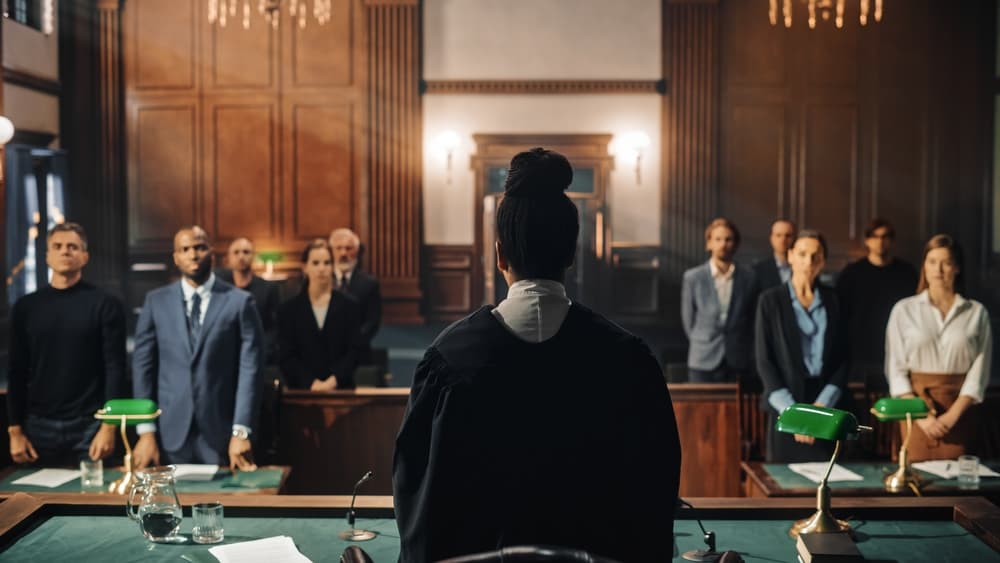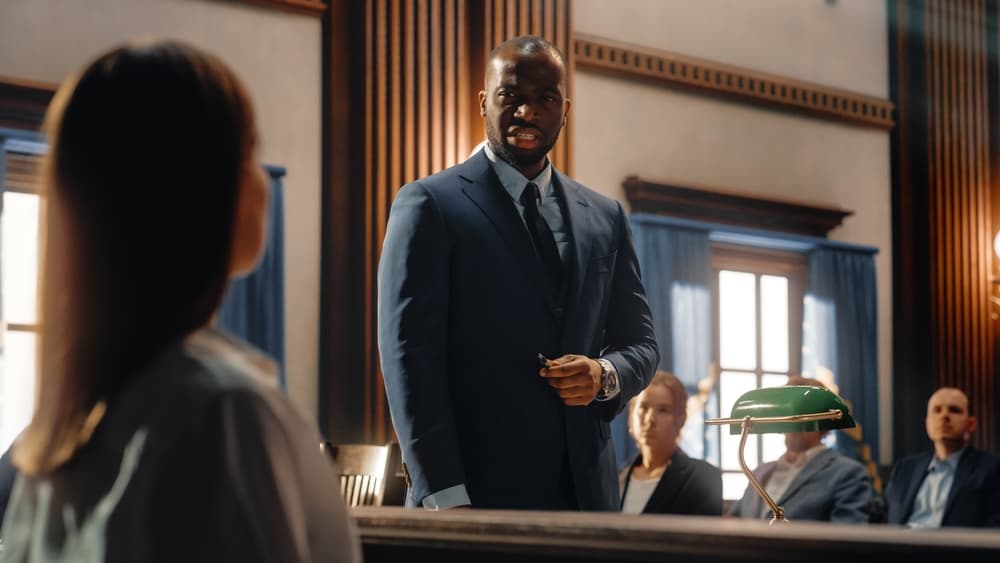Steven A. Bagen | February 25, 2024 | Car Accidents

After a deposition, your car accident lawyer will either negotiate a settlement (perhaps through mediation) or take your case to trial. The deposition is part of the first stage in a car accident trial, known as discovery. This is an information-gathering process in which those involved in the lawsuit may provide sworn testimony.
The outcome of a deposition can help your lawyer determine whether to proceed to trial. However, depending on how your case unfolds, a deposition may not even be necessary.
What Are Depositions in the Context of a Car Accident Case?
When an attorney files a car accident lawsuit, they initiate the steps that may lead to trial. These steps include a pre-trial process known as discovery. A deposition is part of the discovery process.
A deposition:
- Is an interview process during which the plaintiff’s attorneys and civil defense lawyers ask questions of witnesses (which may include you)
- Is recorded (often both by video and a court reporter who creates a written transcript)
- Can conclude in a single session or over multiple days
Questions in a deposition may involve facts about how the accident happened. You may also face questions about your injuries and other accident-related damages. Your attorney will provide extensive preparation, including a brief about the questions you will likely hear.
What Car Accident Victims Must Know About Depositions

Most people will live their entire lives without ever participating in a deposition. This may be uncharted territory for you. While your lawyer will prepare you for the deposition process, some wise rules to follow include:
- Tell the truth: Honesty is the only policy during a deposition. If you exaggerate or make a mistake, the other side can use the sworn statement to undermine your case.
- Defer to your attorney when necessary: Your car accident lawyer will be present during the deposition. If you ever have a question or are unsure how to answer, you can speak with your lawyer.
- Answer questions patiently: Your attorney may object to questions during the deposition. Do not rush to answer; you want to give your lawyer time to voice any necessary objections or clarifications.
- Do not provide unnecessary detail: Brevity is typically best when answering questions during a deposition. If you engage in unnecessarily long or detailed answers, you may say something speculative or comments that hurt your case.
- Keep calm: Depositions can be stressful, and the defense’s attorneys may intentionally try to unnerve you. If you become upset, you may risk saying or doing something that reflects poorly on you and your case.
An attorney can be of immense value during the deposition process and in other aspects of your case. Your lawyer will ensure you are ready for the deposition, and they will be by your side to protect you from harassment, badgering, and inappropriate questioning.
Are Depositions Always Necessary in Car Accident Cases?
While it is beneficial to know about depositions, they are not always necessary in car accident cases. Most cases result in a settlement, and your attorney may reach a financial agreement with liable parties before any pre-trial process becomes necessary.
What Determines Whether My Car Accident Case Will Reach a Deposition (or Trial)?
The answer to one question will determine whether your case requires a deposition and possible trial: Will liable parties offer a settlement covering all of your accident-related damages?
If liable parties agree to pay you a fair settlement, filing a lawsuit and going to trial will not be necessary. On the other hand, if liable parties resist paying the sum you deserve, your lawyer may file a lawsuit, complete a deposition, and take your case to court.
Some factors that can influence whether liable parties agree to a settlement are:
- The strength of evidence proving negligence: If your attorney has a strong case proving who caused the car accident and who is, therefore, liable for your damages, this may compel liable parties to offer a fair settlement.
- The quality of documentation of your accident-related damages: Disputes about the nature or cost of an accident victim’s damages can stand in the way of a settlement agreement. If your attorney secures detailed, conclusive proof of your damages, this may benefit your case during negotiations.
- The compensation you seek: As a basic rule, liable parties may be less willing to pay a large settlement than a smaller one. Therefore, if your attorney seeks a relatively sizable financial recovery, it may be more difficult to obtain through a settlement.
- The severity of your injuries: The more serious your injuries are, the more costly your treatment and related damages will be. Therefore, settlements related to severe injuries can be more difficult to negotiate.
- The willingness of liable parties to gamble in court: Going to trial is a bit of a gamble for all parties, including the defense. If you have a capable lawyer, they may have obtained many large jury verdicts. If the defense knows your attorney’s reputation, they may decide to offer a fair settlement rather than risk a larger loss at trial.
No barrier or challenge is too great for a seasoned car accident lawyer. No matter how tough settlement negotiations are, your lawyer will maintain the mission of securing the compensation you deserve.
What Happens If My Case Moves Past the Deposition Stage?
If your attorney files a car accident lawsuit and it proceeds beyond the deposition, your lawyer may:
- Continue negotiating directly with liable parties: All parties can continue negotiating a settlement even amid a deposition and other pre-trial processes. After seeing testimony during the deposition, liable parties may feel their chances of success at trial are limited and may instead choose to pay you fairly.
- Undergo mediation: If both parties agree, your case may move to mediation proceedings. This is when a neutral third party will serve as a middleman, facilitating a financial agreement between the plaintiff and the defense.
- Follow through on going to trial: If neither further negotiations nor mediation result in an acceptable settlement agreement, your attorney may follow through with a trial. If so, they will prepare and execute your case in front of a judge and jury.
Attorneys are versatile. They can either settle or lobby for a jury to award you the compensation you deserve. The ability to win a case in the negotiating room or in court is a compelling reason to hire a car accident attorney.
Your Lawyer’s Goal Will Be to Recover All of the Compensation You Deserve
Your car accident lawyer will detail each of your accident-related damages, which may include:
Healthcare Costs
Motor vehicle accidents place violent stress on the body, often causing injuries that require:
- Ambulance transport from the accident scene
- Emergency department services
- Surgery
- Overnight (or multi-day) hospital stays
- Repeated doctors visits
- Medical imaging services
- Additional medical services
Few services are as costly as healthcare. Your attorney will demand that those liable for your accident cover all medical bills.
Professional Damages
You may need a long recovery period that prevents you from working. A professional absence may cause:
- Lost income
- Missed chances to earn performance bonuses
- Lost progress toward promotions
- Depression and other psychological symptoms in those who enjoy working
Many accident victims eventually return to work. However, they may earn less than before the collision, which we refer to as diminished earning power. Your lawyer will consider each of these professional damages when calculating a fair settlement value.
Pain and Suffering
Attorneys consider how accidents affect their victims on an emotional and psychological level. A car accident can cause:
- Emotional anguish
- Psychological distress
- Sleep problems
- Diminished quality of life
- Scarring and other types of disfigurement
- Diagnosable conditions like anxiety, depression, and post-traumatic stress disorder (PTSD)
Attorneys also consider physical pain when evaluating a client’s pain and suffering. Chronic pain can be especially important, as it may cause you lifelong hardship.
Property Expenses
Your lawyer will work with experts to assign a financial value to each of these damages. They will present documentation of these damages to liable parties and insist that those liable parties provide the compensation you are entitled to.
Who Should Pay for My Medical Bills and Other Damages After a Car Accident?

One of your attorney’s earliest duties will be determining who owes you compensation for accident-related damages. Potentially liable parties in a car accident case can include:
- A motorist: Motorists regularly engage in dangerous acts like speeding and tailgating, which translate directly into traffic accidents. Negligent motorists may be financially responsible for the medical bills, pain and suffering, and other damages they cause their victims to endure.
- A city, state, or federal government: If unsafe road conditions were a factor in your accident, a governmental body may be liable for your damages. While seeking compensation from such a defendant can be difficult, your attorney will be up to the challenge.
- A vehicle manufacturer: Manufacturers are liable when their products present an unreasonable risk of harm to the user. When vehicle defects cause car accidents, the victims can seek compensation from negligent manufacturers.
- A government contractor: Third parties may contract with local governments for road-related or roadside construction. If a dangerous construction zone results in a car accident, such government contractors may be financially liable for various damages.
- An employer: The employer may be liable for employees’ negligence. Therefore, if the person who caused your car accident was working during the collision, their employer may share liability for your damages.
Each case contains different facts and players. Allow an attorney to determine who caused your accident, who owes you money for damages, and how to seek compensation from those liable parties.
Is It Worth Hiring a Car Accident Lawyer for My Case?
Many satisfied former clients will tell you hiring a car accident lawyer is well worth it. Some of the reasons those clients may cite are:
A Lawyer’s Total Oversight of Your Case
Your lawyer will leave no stone unturned when investigating your accident and preparing your case. An attorney will manage every aspect of your claim or lawsuit, meaning you won’t have to lose sleep over the details of the case.
A Law Firms’ Thorough Financial Support
The law firm you choose to lead your case will:
- Require no upfront fee or payment from you
- Pay the cost of your case—including time, energy, filing fees, and travel costs
- Cover the cost of hiring experts to collaborate on your case
- Cover any other case-related expenses
Car accident lawyers typically build their fees around your financial recovery. If your firm succeeds, it will receive a portion of your settlement or verdict. Otherwise, you’ll pay nothing for your legal representation.
A Lawyer’s History Handling Car Accident Cases
Experience is perhaps the greatest reason (of many) to hire a car accident lawyer. When you hire an attorney with an extensive history of representing car accident victims, they:
- Will understand the various strategies for winning cases like yours
- Be prepared for bad-faith tactics by liable parties
- Know the many steps to take in building a successful case
- Will work to resolve your case as efficiently as possible
You don’t have to handle your case on your own. Relying on an attorney with knowledge and training you don’t possess may be in your best interests.
The Freedom to Focus on Recovery
Importantly, having an attorney handle your case will give you more time for recovery. Because your health should always be your top priority, this is a compelling reason to hire a car accident lawyer.
Hire Your Car Accident Attorneys as Soon as Possible

Statutes of limitations require attorneys to file car accident lawyers within set time frames. When you hire your lawyer as soon as possible after the accident, you can prevent the possibility of missing the filing deadline. Further, the sooner your attorney begins investigating the crash, the more solid evidence might be available, leading to an easier process in many situations.
Consulting a personal injury lawyer gives you peace of mind and costs nothing, so there is no reason to put off seeking the support and representation you need.
